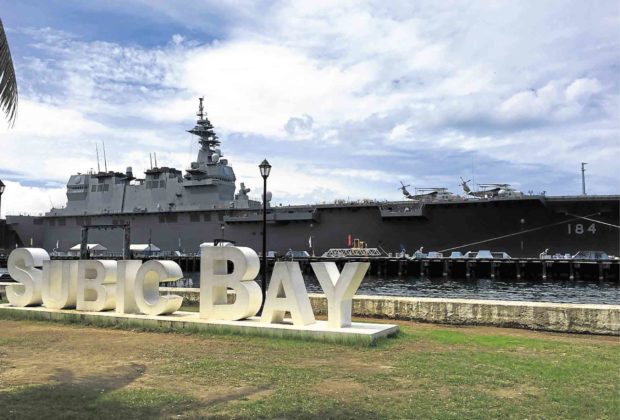Subic to become Israel ‘bridge to Far East’

LINK TO ASIA The Subic port would soon open up to a more global clientele under a new cooperation deal with Israel. — ALLAN MACATUNO
SUBIC BAY FREEPORT—Expect port revenues to surge in this economic zone after the Subic Bay Metropolitan Authority (SBMA) entered into an alliance for the promotion of an “all-water route” between Subic and the Port of Eilat, the only Israeli port in the Red Sea.
The Port of Eilat, which is located at the northern tip of the Gulf of Aqaba, is used mainly for trading with countries in the Far East as it allows Israeli vessels to reach the Indian Ocean without sailing through the Suez Canal. It is also Israel’s gateway to South Africa and Australia.
But the arrangement will mean Israeli vessels will need to traverse disputed waters in the West Philippine Sea.
New businesses
China has asserted its claims over the South China Sea that encroach into the exclusive economic zones of the Philippines and some of its Asian neighbors.
Article continues after this advertisementThe agreement was signed by SBMA chair and administrator, Wilma Eisma, and Eilat Port Co. Ltd. chief executive officer, Gideon Golber, on Sept. 4 during the four-day visit of President Rodrigo Duterte to Israel.
Article continues after this advertisementMarcelino Sanqui, SBMA senior deputy administrator for operations, who accompanied Eisma in Israel, said the agreement would establish an “alliance of cooperation for information sharing” to generate new businesses and promote the water route between the Port of Subic and the Port of Eilat.
“The agreement is important [for accelerating] new improved business practices as well as increasing the level of vessel services in the free port,” Sanqui said in a text message.

PORT DEALSBMA Chair Wilma Eisma (right) and Eilat Port Co. Ltd. CEO Gideon Golber (left) sign the agreement for port cooperation as Trade Secretary Ramon Lopez looks on in one of the highlights of President Duterte’s trip to Israel. —CONTRIBUTED PHOTO
Modern port
Eisma, in a press statement, said the deal would “increase port traffic and revenue for Subic Bay since trade routes for the movement of goods between Eilat and Subic will be firmly established.”
Sanqui said the joint initiatives would involve marketing activities, data interchange, market studies and port modernization.
Philippine Ambassador to Israel Nathaniel Imperial said it was Golber who proposed a partnership between Eilat and a Philippine port in April to make Subic “the bridge of Israel to the rest of the Far East.”
Imperial referred Golber’s offer to Eisma in May, saying the SBMA can learn more about tech innovations made by Israel to its port operations.
Imperial said Eilat was developed in 1965 and was privatized in 2013.
Good trip
At least 60 percent of Israel’s vehicle imports from Japan, India, Thailand and Korea pass through the Eilat port.
Mr. Duterte became the first sitting Philippine President to visit Israel.
He had said that, through his visit, the Philippines sought a “robust relationship” with the Jewish state in areas of economic development, trade and investments, labor, defense, security and law enforcement.
The Subic-Eilat agreement was among 11 memoranda of understanding, three memoranda of agreement and seven letters of intent signed during the President’s trip to Israel.
Subic has one of the country’s deepest ports that was built by the American military to accommodate its warships.
At the height of the Vietnam War, Subic became a key launching pad for naval and air operations by the US Navy against the then communist North Vietnam, putting into full use the former US base’s runways and seaport. —ALLAN MACATUNO